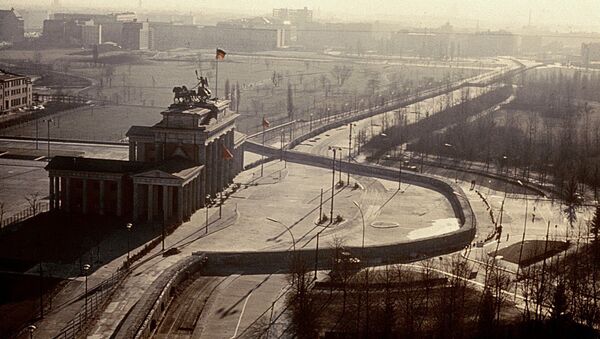The Fifth International Conference, Zinoviev Readings, hosted by Rossiya Segodnya, coincided with the 175th anniversary of Marquis Astolphe de Custine's departure from the Russian Empire. At first glance these events have nothing in common — but only at first glance, member of Rossiya Segodnya's Zinoviev Club Oleg Nazarov says.
Russian character and Russian culture through the eyes of a Russophobe
Racist and Russophobic views have been widespread in the West for a very long time, and they are shared not only by the ideologues of the Anglo-Saxon world. One of the most notorious ideologues of Russophobia over the past 175 years has been Marquis de Custine. He visited the Russian Empire in the summer and fall of 1839. After traveling around our vast expanses for less than four months, the French visitor wrote a book, Russia in 1839 (Empire of the Czar: A Journey Through Eternal Russia). Following its publication in 1843, he gained a reputation in the West and among Western-oriented domestic intellectuals as a leading expert on Russia.
Marquis de Custine had predecessors in maligning Russia. The marquis was familiar with Notes on Muscovite Affairs by Baron Sigismund von Herberstein, published back in 1549. Still, Russia in 1839 became a book that formulated the strategic line of Western propaganda — Russophobia — for two centuries to come.
It is indicative that Russia's Western "friends" and "partners" remembered this book at crucial moments in history. Its new edition went to press ahead of the Crimean War. It appeared in a number of European countries and the US soon after the end of World War II, at the very start of the Cold War. Also telling were the huge print runs that de Custine's "revelations" had during Gorbachev's catastroika.
The reason behind the popularity of de Custine's travel notes was revealed by Zbigniew Brzezinski, a long-standing "friend" of Russia and Russians, who said: "No Sovietologist has yet improved on de Custine's insights into the Russian character and the Byzantine nature of the Russian political system."
The French aristocrat, whose opinion was willingly shared by the US political scientist of Polish descent, claimed that the Russian system of government "unites all the disadvantages of democracy with those of despotism, and rejects everything that is good in both systems." Russians have "more finesse than delicacy, more good temper than kindness, more leniency than tenderness, more discernment than invention, more wit than imagination, more observation than wit, more of the spirit of selfish calculation than all these qualities together. They never labor to produce results useful to others, but always to obtain some recompense for themselves. Creative genius has been denied them; the enthusiasm which produces the sublime is to them unknown… the sacred solitudes of genius are to them inaccessible."
Thus, he regarded as creative genius neither Alexander Pushkin, who created masterpieces and was killed by a bullet fired by Frenchman George d'Anthès, nor Mikhail Lermontov nor Nikolai Gogol (whose Evenings on a Farm Near Dikanka was well known, while his Inspector General had been staged), all of whom had put themselves on the map well before Custine's visit.
"Russophobia, the fear of Russia, which pervades the Frenchman's book, stems not only from the negative qualities of the country he describes but also — not to a lesser but even to a greater extent — the qualities that he admires," journalist and literary critic Vadim Kozhinov wrote.
Alexander Zinoviev also wrote about the fear of those who have purportedly been denied "creative genius."
"The West has always had a fear of ethnic Russians, not [of] military or economic competition. The fear is that Russians allegedly are, in essence, anti-Western. On top of that, there is a huge creative potential. Most of all they feared that Russian culture would break through to the West.
"I can judge this from my own experience. If I were not a Russian, the doors of all universities would be open to me. All publishing houses would be lining up to get me on board. I made it and became famous by mistake. First, they took me for a non-Russian and second, for a dissident. But I turned out to be a Russian and not a dissident. Immediately, there was fear! It was a good thing that by that time, I had already gained some clout in the Western scholarly and literary domain. But they have been shunning me ever since. Let all those who want to go to the West know this. You don't have a chance here if you wish to remain Russian and independent."
How "barbarians" saved "the choicest flower of human kind"
Describing Russians as barbarians, de Custine added condescendingly: "I do not reproach the Russians for being what they are, what I blame in them is their pretending to be what we are. They are still uncultivated; this state would at least allow room for hope; but I see them incessantly occupied with the desire of mimicking other nations, and this they do after the true manner of monkeys, caricaturing what they copy. They thus appear to me spoilt for the savage state, and yet wanting in the requisites of civilization."
Let's face it, starting from False Dmitry I, some domestic intellectuals and politicians have been looking up to the West, talking about it with awe. There were times when these people ended up at the head of the country. The consequences of that are known from the sad results of the final decade of the last century.
In 1994, in an interview with Vladimir Bolshakov, Zinoviev lamented the fact that "our compatriots allow themselves to be taunted, to which they do not respond as they should, and grovel and fawn on the West. A country and its people are judged by those who represent them. And our country and our people are represented by such degenerates that it would be absurd to expect a different attitude from the West, not even to communism but primarily to Russia and Russians."
However, if Zinoviev was talking about some "degenerates," de Custine assured his readers that almost all Russians "are wanting in the requisites of civilization."
Characteristically, 75 years later, similar views were expounded by the tourist's fellow countryman, Maurice Paleologue, the French ambassador to the Russian Empire. He lived in Russia for several years, socialized with representatives of the Russian elite and knew far more about Russia than de Custine did. He was the one who pleaded with Nicholas II for assistance during the first weeks of World War I, which were tragic for France. Today, as Russia and France are marking the centennial of the outbreak of the war, it is important to remember that Russia's assistance came just at the right moment. "If France has not been wiped off the map of Europe, it is above all to Russia that we owe it," French Marshal Ferdinand Foch wrote.
Paleologue found no words of gratitude for our grandfathers and great grandfathers. Moreover, soon after they saved France from the rout, the ambassador wrote: "From the point of view of culture, and as a product of civilization, the French and the Russians are not in the same class. The empire of the Tsars is one of the most backward countries in the world… With this ignorant and primitive mass compare our army: all the soldiers educated men; the majority highly intelligent and of fine feeling; at its head a countless legion of young men who have already given proof of leadership, learning, taste and talent — the choicest flower of human kind."
Once more about Russian "barbarity" and the French "Black Code"
"What most disgusts me is the refined elegance which is exhibited in the same picture with such revolting barbarity. If there were less luxury and delicacy among the higher orders, the condition of the lower would inspire me with less indignation," de Custine wrote.
To be sure, there was a grain of truth in his words. However, it was precisely a case in which the French intellectual, who saw a speck in another person's eye, "forgot" about the log in his own eye. After all, he criticized the Russian ways at a time when his compatriots were practicing slavery. France had the "Black Code [Code Noir] Concerning the Enforcement of Order in the French American Islands," which established that slaves were "community property." A slave who struck his master or the wife of his master, his mistress or their children or who stole horses, mules, bulls or cows would be executed. The code prohibited "slaves who belong to different masters from gathering, either during the day or at night, under the pretext of a wedding or other excuse, either at one of the master's houses or elsewhere, and especially not in major roads or isolated locations. They shall risk corporal punishment that shall not be less than the whip and the fleur de lys, and for frequent recidivists and in other aggravating circumstances, they may be punished with death." Fugitive slaves absent for a month would have their ears cut off and would be branded. For another escape, their hamstring would be cut and they would be branded again. A third time and they would be executed.
Ksenia Myalo, in an article entitled "Travels to the Barbarians or the Marquis de Custine's Eternal Voyage," recalled that "France had the exclusive honor of authoring a document called the Black Code establishing a two-century old European practice. The Black Code is an edict of 60 articles published by Louis XIV in March 1685, and it was finally abolished in 1848 (in 1794, it was suspended but was reinstated in 1802). In other words, it was the legally formalized exclusion of an entire race of people — blacks — from the concept of law at a time when the philosophy of human rights and freedoms was beginning to take shape.
"In other words, throughout the period when, according to de Custine and Brzezinski, Russia was wallowing in barbarity, European (more broadly, Western) mentality was at home with the immanent idea of a divided, unequal humankind. Moreover, legal inequality was supposed only to formalize anthropological and even metaphysical inequality."
It is noteworthy that this blatant inequality was pointedly "overlooked" by European enlighteners, who used up mountains of paper writing in support of various rights and freedoms. By the same token, at the start of the 21st century, many Western intellectuals are unable to see any signs of genocide against Russian speakers in Donbass and the Lugansk region. They are wondering whether people in Odessa might have burned themselves to death in the House of Trade Unions on May 2 and whether dozens of young women in Donbass might have raped, executed and buried themselves.
The "night blindness" of Western intellectuals can be attributed not only to pressure from Washington but also to the long-standing traditions of European Russophobia.
Against the backdrop of historical facts, de Custine's revelations confirm the conclusion by the participants in the Zinoviev Readings about Western ideology as a false bottom ideology. There is one thing written on the wrapping of this "candy" but there is something totally different inside. No changes can be expected there.
Russophobia will also remain. The following remarks by Alexander Zinoviev, a great Russian thinker, are especially relevant today: "The West has a special score to settle with Russia. It has challenged its global domination. Commitment to the Cold War will remain forever. This is not about communism. There is plenty of communism in the West as well. The goal is to destroy all things Russian, and it is being relentlessly pursued. First, keep Russians out of world culture, belittle the achievements of Russian culture and obliterate all things Russian. Second, destroy the Russian human fabric itself. There is a reason why people are being corrupted. There is a whole human corruption program. We are being treated as the North American Indians were treated."
Oleg Nazarov, Doctor of History, member of Rossiya Segodnya's Zinoviev Club


